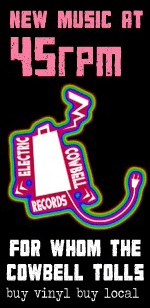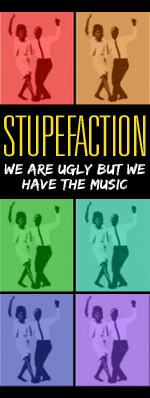
So nice, we read it twice. —Ed.
Genre-wise, Josh Rosenthal’s new book is a medley of memoir, music criticism, and a how-to guide on music listening.
Entitled The Record Store of the Mind, it loosely tells the story of Rosenthal’s musical life from his origins as a PolyGram intern right up until his recent-ish (2005) founding of Tompkins Square Records. Along that route, he had stints at larger operations—Columbia and Sony.
Rosenthal’s releases through Tompkins Square over the past ten years have largely consisted of reissued and long-forgotten musical material (i.e. Roland White’s 1976 album I Wasn’t Born to Rock’n Roll) and never-before-released-but-should-have-been-long-ago material (i.e. Tim Buckley’s Live at the Folklore Center, NYC – March 6, 1967). This chosen focus stays true to Rosenthal’s record collector character—forever seeking out a classic bit of vinyl that people have forgotten about and need to hear again right away.
This kind of mindset places worth upon history, it places worth upon the effects of passed time on a work of art. It places worth upon the voice of a narrow perspective that spoke directly from a given year, a year during which a myriad of events occurred, a year that was defined by statistics which determined its color and taste, statistics that could never be reproduced in that same way ever again.
Any given album, even though it might be reperformed or drawn upon for creative influence by new artists, stands on its own as a time capsule of sorts, which may or may not possess varying degrees of present-day relevance. The unique archival nature of Rosenthal’s record company makes him an interesting writer with an eclectic collection of musical tales and insights, very personal to him, but much of which is easily relatable for the pop-rock music fan.
Tone-wise, Rosenthal’s narration is—as music industry narration tends to be—conversational, direct, and singular in focus. Refreshingly, rather than a burned-out, slightly embittered, it-was-so-much-better-back-then voice, Rosenthal manages to maintain one that puts forth a positivity and faith in the ongoing legacy of musical creation. He seems to have preserved his original passion for music of all kinds that began when he was a young kid. He is enthusiastic and wants you to be enthusiastic too. Overly jaded he is not.
Persona-wise, Rosenthal is a passionate record collector and crate digger—and a keeper of many a rock and roll anecdote, having met, worked with, and gone to numerous shows by well-known musical acts. He has very good taste, something that many music enthusiasts possess, and so the reader’s journey is akin to hanging out with that buddy of yours who has The Best Taste in music and knows all of these record albums out of music history that may have been overlooked by the mainstream and who is quick to lend them to you so that you too can listen.

Rosenthal also conveys a sense of even-tempered fair-mindedness. After all, when was the last time you read “I hope you’ll be inspired!” in a music-guy’s book intro? This nice-guy-ness makes for a lovely reading experience, albeit a bit lukewarm at times—in truth, it is sometimes more wild fun to read the musical ramblings of an insane man.
Format-wise, the book is a series of short chapters that spring from all over Rosenthal’s musical life map, the unpredictability of which is engaging. Sometimes the anecdotal quality wears the reader out a bit, as the organization is semi-disjointed in its list-ness rather than the making of a cohesive flowing tale.
This book’s shtick is probably most beneficial to those who want to know what music they should listen to because their undeveloped musical tastes have no idea. For equally devout rock and roll fans however, it might be less exciting, unless they want their own good tastes reaffirmed or want to compare their own box of past concert ticket stubs to Rosenthal’s. Which, come to think of it, is something that music geeks tend to do.
Obsession attracts obsession, and record collectors are generally obsessed people. Whatever grand and vast musical knowledge they may already possess seeks to build upon itself and expand—and The Record Store of the Mind accomplishes that.







